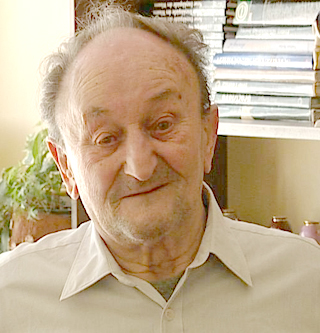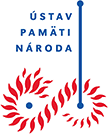Imrich Danko (1923)

Biography:
“You have to take life as you find it. It is necessary to forget embarrassing or painful stages and enjoy yourself, show a smile, that’s the point. That is life.”
Imrich Danko was born on April 18, 1923, in Šášovské Podhradie. His father Gabriel Danko was a train guide and his mother Augustína Danková worked as a housekeeper. He had also two siblings, brother called Vojtech and sister Margita. When he had passed the school-leaving examination in 1944 at higher industrial school of construction, he participated in the Slovak National Uprising, was arrested by Germans, and imprisoned in Handlová prison for 14 days. After the war he worked as a builder at various positions from Modra to Bratislava. In 1949 he had the first conflict with the communist regime and was convicted of misappropriation of building material and sentenced to one month of imprisonment in Nitra. On March 30, 1949, he married Edita Pišková and later on they had one daughter. During the war, Imrich’s brother was an officer in the Slovak Army and he also participated in the Slovak National Uprising. After the war he worked as a notary in Detva; however, after the communist regime took over the government he had a conflict with his superior. Imrich’s sister married Pavol Valent, who worked as a technical manager of radio transmitters in Prievoz and Veľké Kostoľany. The transmitter firstly came under the post office, but since 1948 it was administrated by the Ministry of the Interior that was controlled by the State Security. In 1952 due to many conflicts with his superiors, Vojtech Danko asked Pavol Valent, who worked in Petržalka district, to help him to flee across the border to Austria. The State Security soon found out that Vojtech fled and a roundup started. During the intense searching for offenders of the so-called conspiracy, Imrich Danko was arrested on January 14, 1952. His father, sister and her husband were also taken into custody. When he was arrested, they battered him and under the mental pressure he was forced to confess to anti-state activities. On March 7, 1953, he was given eight years of imprisonment; his brother in law was sentenced to death, his sister was sentenced to life imprisonment and Imrich’s father was given eleven years. Imrich served his sentence in many correctional institutions of former Czechoslovakia. During his imprisonment he got divorced with his wife. Thanks to the presidential amnesty he was finally released from prison in 1960.
Brother in Law Helps with the Escape
“Pavol Valent was a technical manager of radio transmitters in Prievoz and Veľké Kostoľany. Until the year 1948, the transmitters had come under the post office, but then the Ministry of the Interior took control of it, so he was registered as the State Security member. It was Valent who guided my brother across the border. Brother asked him to do that because Valent was a member of the State Security and had a district in Petržalka - Čierny les and there was the state border between Austria and Slovakia, Czechoslovakia, actually. And from that place he guided my brother across the border, though, somebody had to tell it, otherwise I don’t know how the State Security found that out. They simply detained him and executed.”
“I Rose above It…”
“As for that January 1952, I came for lunch to my sister’s house. Those two men and one woman had already been there, of course, they were the State Security members. And my sister had three little children. They asked me immediately who I was and what I was doing there, so I answered and they responded: “You are arrested.” Well, I rose about it because I pleaded not guilty; I knew nothing about their reasons for my arrest.”
Detention on Remand
“When they transported me to prison on Záhradnícka Street, I faced the very nature of that hate and malice. It was January, it was cold, I had just one blanket and when I slept I could only have my arms stretched out. The most terrifying was that my place was near the room where they used to investigate prisoners. I heard those wails and beating even in the cell where I slept. It was a bit better during the day but terrible at night. Unbearable. I had to listen to those cries, that pain. Later, when they inquired me, I wanted to know what I had been blamed for. Supposedly, I phoned my father and asked him to come for Petrík, they said it was a sign of our collusion. So I told them that it was untruth. Then they hit me into my face, into my right eye and they did it very hard. And I realized what kind of people they were.”
The First Day in Jáchymov Mine
“The worst situation was in Svätopluk camp where I had worked; let’s say as a civilian site manager. I came there for the first time, but I hadn’t done that work before; I absolutely didn’t know what underground mining of uranium meant. I didn’t know how to do it. So, there was one Slovak who had to charge and blast what they mined there. We had to drill holes and he blasted it, so he took us to the end of mine. There were miles of tunnels because old miners worked there a long time ago. He took us there. I was there with a man from Morava who had been in mines for three days and knew nothing, too. We, complete strangers, climbed fifty meters down the ladders to drill there; we had acetylene lamps, so we could smoke there, there was no gas. One of us sneezed and our lamps went out. Then in that pitch dark, just imagine it; I had never climbed fifty meters in the darkness like that. It consisted of excavation, mining, perhaps cutting from the excavation, and middle mining leading from that cutting and then there were flues. And we were on that flue. We didn’t know what to do. So we went down and then along those flues. My arms were all bloody. It was the first time I was in the mine.”
The Story from Prison in Opava
“Well, in other prisons in Opava, it was quite good there. In this prison there was a yard and we could go there. We could play volleyball and guards didn’t mind it because these things were technical ones. Let’s say there were about two hundred prisoners and most of them had a university degree. There were many departments such as building, engineering, shipping, nuclear department and many others, and those guards didn’t understand it at all. Even if he came to the board or drawing, he didn’t have a clue. Our activities were always appointed. For example, we were assigned to work on a construction in Karviná, on all the blocks of flats and building plans. The guard said nothing. They all were quite intelligent and sympathetic with us. I felt good there. Except the situation when they caught us as we were making some coffee without permission, but they did nothing to us.”
The story and videoclips of this witness were put together and published thanks to the financial support of EU within the programme Europe for Citizens – Active European Remembrance.


Updated at: 27.02.2024
Print Tweet